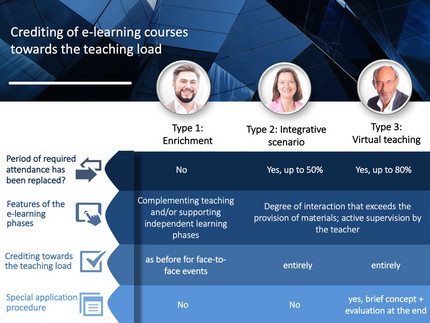Media didactic planning kit (available in German only)
The Koblenz University of Applied Sciences provides an "interactive planning matrix". This allows for a media-didactically structured development of events on the basis of didactic models that have been tested in teaching practice. It makes it easier to choose among a classified selection of multimedia and e-learning tools for your individual blended learning, e-learning and classical teaching and learning offers.
Information on the different forms of media, their development and integration is provided by the consultancy and support services of the ZfQ's Teaching and Media Department and the e-learning coordinators of the faculties.
Typical scenarios
Lecture
Seminar / discussion group (tutorials)
Office hours / Consultation / Working group meetings
Which event format would you like to support or enrich digitally? For selected formats and typical teaching activities, we suggest the most suitable tools.
The basic rule is: "make it simple" & "simply do it"
If you have any questions or would like to exchange ideas with other teachering staff and especially colleagues with experience in e-teaching, take a look at this Moodle Course: Community - Peer consultation with colleagues.
Ask questions or tell us about your own experiences.

